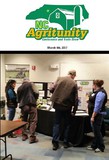North Carolina
In December 2016, the NC Assistive Technology Program (NCATP) staff trained in AgrAbility and farm assessments presented to all NCATP consultants and speech language pathologists across North Carolina. The purpose of the presentation was to train AT consultants on the purpose of the AgrAbility program and introduce them to assistive technology in farming. Due to the positive interest and feedback, NCATP management is planning on a follow-up training that will include farm assessments, the culture of farming, tools for assessment, and medical conditions prevalent in the farming industry.
 NC AgrAbility, in conjunction with NC Agromedicine Institute, staffed a booth at the 2017 NC Agritunity Conference and Trade Show. This event is designed to meet the economic and environmental needs of small and large farmers. NC Agritunity aims to generate a positive impact by building a connection between farmer, educator, and agriculture-related business. The objectives are to help farmers increase production, improve production systems, start or expand new markets, and increase profitability. More than 100 farmers from different counties in NC attended the event.
NC AgrAbility, in conjunction with NC Agromedicine Institute, staffed a booth at the 2017 NC Agritunity Conference and Trade Show. This event is designed to meet the economic and environmental needs of small and large farmers. NC Agritunity aims to generate a positive impact by building a connection between farmer, educator, and agriculture-related business. The objectives are to help farmers increase production, improve production systems, start or expand new markets, and increase profitability. More than 100 farmers from different counties in NC attended the event.
 NC AgrAbility staff, partners, clients, and students participated in the 2017 NTW in Knoxville, TN. NC AgrAbility Project's booth exhibited information about resources for farmers with disabilities and photos of some of the farmers that have been served by the program or that are in the process of receiving services.
NC AgrAbility staff, partners, clients, and students participated in the 2017 NTW in Knoxville, TN. NC AgrAbility Project's booth exhibited information about resources for farmers with disabilities and photos of some of the farmers that have been served by the program or that are in the process of receiving services.
Dr. Paula Faulkner, associate professor in the Department of Agribusiness, Applied Economics and Agriscience Education, North Carolina A&T State University, represented NC AgrAbility on the panel for the NTW session, "Working with your 1890 Institution." Participants shared how their 1890 university serves AgrAbility clients by working in collaboration with the 1862 land-grant universities and by creating partnerships with institutions that have similar goals and objectives. Panelists emphasized the importance of maximizing the ability to reach out to the community and provide resources to farmers, ranchers, and farm-workers.
Dr. Ari Mwachofi, associate professor in the Department of Public Health Brody School of Medicine, Eastern Carolina University, and Robin Tutor-Marcom, Director of the NC Agromedicine Institute, presented their research findings at the 2017 NTW. The research study, titled "Farming with a Disability: Perspectives of Minority Farmers in Eastern North Carolina", had the objective of determining the disability-associated needs of minority farmers in NC, whether they have information about available services, obstacles to accessing services, types of services needed, and methods of improving access to services. The information was gathered from minority farmers through four focus groups. The study found that minority farmers have different perceptions about disability and are unaware of services available and methods to access such services. The study also found that income eligibility requirements exclude farmers from accessing VR services in NC.
Client Kyle Cashwell participated in the "USDA/FSA Beginning Farmer Outreach" NTW session by sharing his experiences with the various FSA programs through which he encouraged farmers to take advantage of all the available resources to new and existing farmers.
NC A&T Landscape Architecture program students: Puja Oza, Dante Brewer, Kenneth Reid and Courtney Hurley presented an NTW poster titled, "The Eco Dome." The poster focuses on creating an eco friendly environment to grow crops year-round. The eco-dome is a structure that is composed of photovoltaic glass which acts as an energy source. Inside the dome there is a healing garden in the middle where people can come and relax in an inviting space. Along the sides of the dome are where the crops and raised beds are. The dome uses an aquaponics system that allows crops to grow year-round. The aquaponics system is sustainable in the sense that the fish and plants create their own ecosystem cycle. Everything in the dome is accessible to people with disabilities.
Submitted by Beatriz (Betty) Rodriguez
